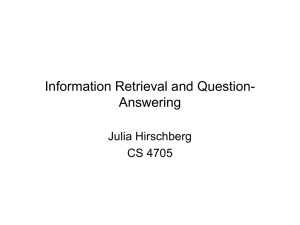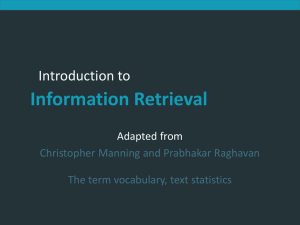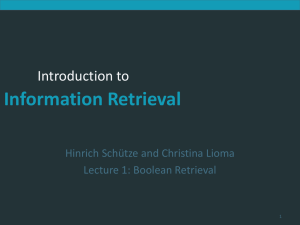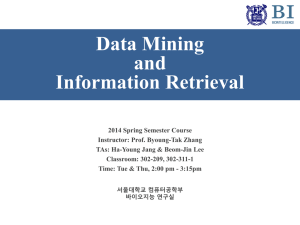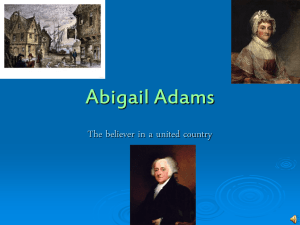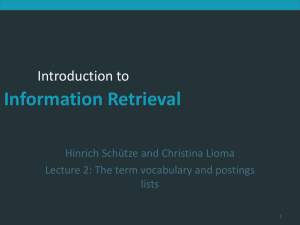Intelligent Information Retrieval
advertisement
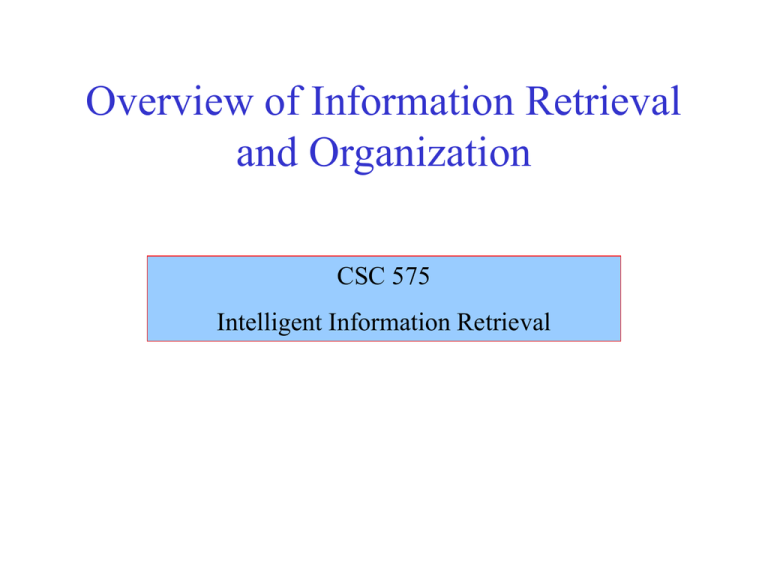
Overview of Information Retrieval and Organization CSC 575 Intelligent Information Retrieval 2 Source: Intel How much information? • • • • • • Google: ~20-30 PB a day Wayback Machine has ~4 PB + 100-200 TB/month Facebook: ~3 PB of user data + 25 TB/day eBay: ~7 PB of user data + 50 TB/day CERN’s Large Hydron Collider generates 15 PB a year In 2010, enterprises stored 7 Exabytes = 7,000,000,000 GB 640K ought to be enough for anybody. Information Overload • “The greatest problem of today is how to teach people to ignore the irrelevant, how to refuse to know things, before they are suffocated. For too many facts are as bad as none at all.” (W.H. Auden) Intelligent Information Retrieval 4 Information Retrieval • Information Retrieval (IR) is finding material (usually documents) of an unstructured nature (usually text) that satisfies an information need from within large collections (usually stored on computers). • Most prominent example: Web Search Engines 5 Information Hierarchy • Wisdom • Knowledge • Information Data Intelligent Information Retrieval • Data – The raw material of information Information – Data organized and presented by someone Knowledge – Information read, heard or seen and understood Wisdom – Distilled and integrated knowledge and understanding 6 Web Search System Web Spider Document corpus Query String IR System 1. Page1 2. Page2 3. Page3 . . Intelligent Information Retrieval Ranked Documents 7 Web Search Systems • General-purpose search engines – Direct: Google, Bing, Ask Jeeves. – Meta Search: WebCrawler, Search.com, etc. • Hierarchical directories – Yahoo, and other “portals” – databases mostly built by hand • Specialized Search Engines – home page finders – Shopping bots • Personalized Search Agents • Social Tagging Systems Intelligent Information Retrieval 8 Web Search Systems Intelligent Information Retrieval 9 Web Search by the Numbers Intelligent Information Retrieval 10 Web Search by the Numbers • 91% of users say they find what they are looking for when using search engines • 73% of users stated that the information they found was trustworthy and accurate • 66% of users said that search engines are fair and provide unbiased information • 55% of users say that search engine results and search engine quality has gotten better over time • • • • • • 93% of online activities begin with a search engine 39% of customers come from a search engine (Source: MarketingCharts) Over 100 billion searches being each month, globally 82.6% of internet users use search 70% to 80% of users ignore paid search ads and focus on the free organic results (Source: UserCentric) 18% of all clicks on the organic search results come from the number 1 position (Source: SlingShot SEO) Source: Pew Internet: Search Engine Usage 2012 Intelligent Information Retrieval 11 Key Issues in Information Lifecycle Creation Active Authoring Modifying Using Creating Retention/ Mining Organizing Indexing Accessing Filtering Storing Retrieval Semi-Active Discard Distribution Networking Utilization Disposition Intelligent Information Retrieval Searching Inactive 12 Key Issues in Information Lifecycle • Organizing and Indexing – What types of data/information/meta-data should be collected and integrated? – Types of organization? Indexing? • Storing and Retrieving – How and where is information stored? – How is information recovered from storage? – How to find needed information? • Accessing/Filtering Information – How to select desired (or relevant) information? – How to locate that information in storage? Intelligent Information Retrieval 13 IR v. Database Systems • Emphasis on effective, efficient retrieval of unstructured (or semi-structured) data • IR systems typically have very simple schemas • Query languages emphasize free text and Boolean combinations of keywords • Matching is more complex than with structured data (semantics is less obvious) – easy to retrieve the wrong objects – need to measure the accuracy of retrieval • Less focus on concurrency control and recovery (although update is very important). Intelligent Information Retrieval 14 Cognitive (Human) Aspects IR • Satisfying an “Information Need” – – – – – types of information needs specifying information needs (queries) the process of information access search strategies “sensemaking” • Relevance • Modeling the User Intelligent Information Retrieval 15 Cognitive (Human) Aspects IR • Three phases: – Asking of a question – Construction of an answer – Assessment of the answer • Part of an iterative process Intelligent Information Retrieval 16 Question Asking • Person asking = “user” – In a frame of mind, a cognitive state – Aware of a gap in their knowledge – May not be able to fully define this gap • Paradox of IR: – If user knew the question to ask, there would often be no work to do. • “The need to describe that which you do not know in order to find it” Roland Hjerppe • Query – External expression of this ill-defined state Intelligent Information Retrieval 17 Question Answering • Say question answerer is human. – – – – – Can they translate the user’s ill-defined question into a better one? Do they know the answer themselves? Are they able to verbalize this answer? Will the user understand this verbalization? Can they provide the needed background? • What if answerer is a computer system? Intelligent Information Retrieval 18 Why Don’t Users Get What They Want? Example: User Need Translation Problem User Request Query to IR System Need to get rid of mice in the basement What’s the best way to trap mice? mouse trap Polysemy Synonymy Results Intelligent Information Retrieval Computer supplies, software, etc. 19 Assessing the Answer • How well does it answer the question? – Complete answer? Partial? – Background Information? – Hints for further exploration? • How relevant is it to the user? • Relevance Feedback – for each document retrieved • user responds with relevance assessment • binary: + or • utility assessment (between 0 and 1) Intelligent Information Retrieval 20 Information Retrieval as a Process • Text Representation (Indexing) – given a text document, identify the concepts that describe the content and how well they describe it • Representing Information Need (Query Formulation) – describe and refine info. needs as explicit queries • Comparing Representations (Retrieval) – compare text and query representations to determine which documents are potentially relevant • Evaluating Retrieved Text (Feedback) – present documents to user and modify query based on feedback Intelligent Information Retrieval 21 Information Retrieval as a Process Information Need Document Objects Representation Representation Query Indexed Objects Comparison Relevant? Evaluation/Feedback Retrieved Objects Intelligent Information Retrieval 22 Keyword Search • Simplest notion of relevance is that the query string appears verbatim in the document. • Slightly less strict notion is that the words in the query appear frequently in the document, in any order (bag of words). Intelligent Information Retrieval 23 Problems with Keywords • May not retrieve relevant documents that include synonymous terms. – “restaurant” vs. “café” – “PRC” vs. “China” • May retrieve irrelevant documents that include ambiguous terms. – “bat” (baseball vs. mammal) – “Apple” (company vs. fruit) – “bit” (unit of data vs. act of eating) Intelligent Information Retrieval 24 Query Languages • A way to express the question (information need) • Types: – – – – – – Boolean Natural Language Stylized Natural Language Form-Based (GUI) Spoken Language Interface Others? Intelligent Information Retrieval 25 Ordering/Ranking of Retrieved Documents • Pure Boolean retrieval model has no ordering – Query is a Boolean expression which is either satisfied by the document or not • e.g., “information” AND (“retrieval” OR “organization”) – In practice: • order chronologically • order by total number of “hits” on query terms • Most systems use “best match” or “fuzzy” methods – vector-space models with tf.idf – probabilistic methods – Pagerank • What about personalization? Intelligent Information Retrieval 26 Sec. 1.1 Example: Basic Retrieval Process • Which plays of Shakespeare contain the words Brutus AND Caesar but NOT Calpurnia? • One could grep all of Shakespeare’s plays for Brutus and Caesar, then strip out lines containing Calpurnia? • Why is that not the answer? – Slow (for large corpora) – NOT Calpurnia is non-trivial – Other operations (e.g., find the word Romans near countrymen) not feasible – Ranked retrieval (best documents to return) • Later lectures 27 Sec. 1.1 Term-document incidence Antony and Cleopatra Julius Caesar The Tempest Hamlet Othello Macbeth Antony 1 1 0 0 0 1 Brutus 1 1 0 1 0 0 Caesar 1 1 0 1 1 1 Calpurnia 0 1 0 0 0 0 Cleopatra 1 0 0 0 0 0 mercy 1 0 1 1 1 1 worser 1 0 1 1 1 0 Brutus AND Caesar BUT NOT Calpurnia 1 if play contains word, 0 otherwise Sec. 1.1 Incidence vectors • Basic Boolean Retrieval Model – we have a 0/1 vector for each term – to answer query: take the vectors for Brutus, Caesar and Calpurnia (complemented) bitwise AND – 110100 AND 110111 AND 101111 = 100100 • The more general Vector-Space Model – allows for weights other that 1 and 0 for term occurrences – provides the ability to do partial matching with query key words 29 IR System Operations Information need Collections Pre-process text input Parse Query Rank Index Reformulated Query Re-Rank IR System Architecture User Interface User Need User Feedback Query Ranked Docs Intelligent Information Retrieval Text Text Operations Logical View Query Operations Searching Ranking Indexing Database Manager Inverted file Index Retrieved Docs Text Database 31 IR System Components • Text Operations forms index words (tokens). – Stopword removal – Stemming • Indexing constructs an inverted index of word to document pointers. • Searching retrieves documents that contain a given query token from the inverted index. • Ranking scores all retrieved documents according to a relevance metric. Intelligent Information Retrieval 32 IR System Components (continued) • User Interface manages interaction with the user: – Query input and document output. – Relevance feedback. – Visualization of results. • Query Operations transform the query to improve retrieval: – Query expansion using a thesaurus. – Query transformation using relevance feedback. Intelligent Information Retrieval 33 Sec. 1.1 Organization/Indexing Challenges • Consider N = 1 million documents, each with about 1000 words. • Avg 6 bytes/word including spaces/punctuation – 6GB of data in the documents. • Say there are M = 500K distinct terms among these. • 500K x 1M matrix has half-a-trillion 0’s and 1’s (so, practically we can’t build the matrix) • But it has no more than one billion 1’s – i.e., matrix is extremely sparse • What’s a better representation? – We only record the 1 positions (“sparse matrix representation”) 34 Sec. 1.2 Inverted index • For each term t, we must store a list of all documents that contain t. – Identify each by a docID, a document serial number Brutus 1 2 Caesar 1 2 Calpurnia 2 31 4 11 31 45 173 174 4 5 6 16 57 132 54 101 What happens if the word Caesar is added to document 14? What about repeated words? More on Inverted Indexes Later! Some Features of Modern IR Systems • • • • • • • • • Relevance Ranking Natural language (free text) query capability Boolean or proximity operators Term weighting Query formulation assistance Visual browsing interfaces Query by example Filtering Distributed architecture Intelligent Information Retrieval 36 Intelligent IR • Taking into account the meaning of the words used. • Taking into account the order of words in the query. • Adapting to the user based on direct or indirect feedback (search personalization). • Taking into account the authority and quality of the source. • Taking into account semantic relationships among objects (e.g., concept hierarchies, ontologies, etc.) • Intelligent IR interfaces • Information filtering agents Intelligent Information Retrieval 37 Other Intelligent IR Tasks • • • • • • • • • Automated document categorization Automated document clustering Information filtering Information routing Recommending information or products Information extraction Information integration Question answering Social Network Analysis Intelligent Information Retrieval 38 Information System Evaluation • IR systems are often components of larger systems • Might evaluate several aspects: – – – – – assistance in formulating queries speed of retrieval resources required presentation of documents ability to find relevant documents • Evaluation is generally comparative – system A vs. system B, etc. • Most common evaluation: retrieval effectiveness. Intelligent Information Retrieval 39 Evaluating Effectiveness • Effectiveness of retrieval depends on the “relevance” of the documents retrieved • Effectiveness is often measured in terms of “recall” and “precision” – Recall effectiveness • proportion of relevant material actually retrieved – Precision • proportion of retrieved material actually relevant Intelligent Information Retrieval 40 Relevance • Relevance is difficult to define precisely • A relevant document is “judged” useful in context of a query – – – – who judges? What is useful? Humans not very consistent judgements depend on more than the document and the query • With real collections, never know full set of relevant documents • Any retrieval model includes and implicit definition of relevance, e.g. – distance metrics – P(relevance | query, document) Intelligent Information Retrieval 41 Retrieved vs. Relevant Documents Recall | Rel | High Recall High Precision | Ret Rel | Retrieved Relevant Intelligent Information Retrieval 42 Retrieved vs. Relevant Documents Precision | Ret | High Recall High Precision | Ret Rel | Retrieved Relevant Intelligent Information Retrieval 43 Precision/Recall Curves • There is a tradeoff between Precision and Recall • So measure Precision at different levels of Recall precision x x x x recall Intelligent Information Retrieval 44 Precision/Recall Curves • Difficult to determine which of these two hypothetical results is better: precision x x x x recall Intelligent Information Retrieval 45 Test Collections • Compare retrieval performance using a test collection – set of documents – set of queries – set of relevance judgments • To compare the performance of two techniques – each technique used to evaluate test queries – results (set or ranked list) compared using some performance measure (e.g., precision and recall) • Usually test with multiple collections – performance is collection dependent Intelligent Information Retrieval 46 IR on the Web vs. Classsic IR • Input: publicly accessible Web • Goal: retrieve high quality pages that are relevant to user’s need – static (text, audio, images, etc.) – dynamically generated (mostly database access) • What’s different about the Web: – – – – – heterogeneity lack of stability high duplication high linkage lack of quality standard Intelligent Information Retrieval 47 Profile of Web Users • Make poor queries – short (about 2 terms on average) – imprecise queries – sub-optimal syntax (80% of queries without operator) • Wide variance in: – needs and expectations – knowledge of domain – bandwidth • Impatience – 85% look over one result screen only – 78% of queries not modified Intelligent Information Retrieval 48

